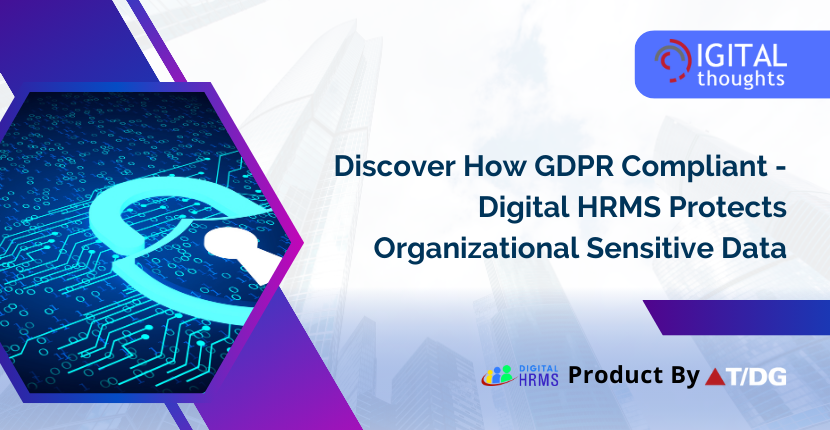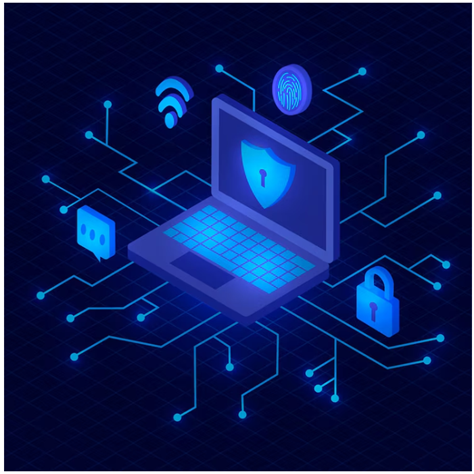How to Ensure Data Security and GDPR Compliance in HRMS Software?

In today’s digital world, Human Resource Management Systems (HRMS) play a vital role in managing all HR data like- employee data, payroll, and other important modules. However, with the increasing dependence on technology, ensuring data security and compliance with regulations like the General Data Protection Regulation (GDPR) is top priority. There is a vast importance of data security in HR software and here we will explore practical measures to achieve GDPR compliance.

The Implication of HRMS Data Security
HRMS software contains sensitive employee information, including personal data, financial records, and performance evaluations as well. Safeguarding this data privacy and security through HRMS data security is crucial to prevent unauthorized access, data breaches, and potential legal repercussions.
Find out why HRMS data security (data privacy and security) matters:
1. Risk of Cyberattacks: HRMS systems are often soft targets for cybercriminals intending to steal or compromise employee data. A slightest breach can potentially lead to financial losses and damage an organization’s reputation without HRMS data security.
2. Legal Implications: For any organization, mishandling employee data privacy and security results in legal penalties. GDPR, specifically, imposes stringent requirements on data protection and user consents.
GDPR Compliance and HR Software Through HRMS Data Security
GDPR, which was enacted by the European Union (EU) in 2018, oversees data privacy and protection. It primarily, applies to any business or website collecting data from EU and UK citizens. The non-compliance of any rules can lead to hefty fines as well as loss of trust from clients.
Learn how HRMS data security can achieve GDPR compliance:
- User Consent: Organizations must acquire unambiguous user consent before collecting and storing any personal data.
- Data Encryption: Sensitive data from users must be encrypted both in transit and at rest. Only authorized personnel get access due to HRMS data security, to the information after decryption.
- Regular Monitoring and Audit: Monitoring HRMS data security measures are a continuous process and regular audits should be conducted to identify vulnerabilities.
- Authentication: Robust authentication mechanisms (e.g., biometrics, OTPs) must be implement to ensure authorized access.
- Authorization: Data access must be limited to authorized personnel within the organization.
- Software Updates: The HRMS software should be kept up to date. Security patches and enhancements are often released by the developers of the organization for data privacy and security.
- Data Backups: Employee data should be regularly backed up to prevent loss due to system failures or breaks.
What are the Benefits of GDPR-Compliant HRMS Data Security Software - Digital HRMS?
Investing in a GDPR-compliant HRMS data security software like- Digital HRMS offers several advantages:
- Checks and analyze old data periodically, confirming retention policies comply with GDPR guidelines.
- Quickly remove obsolete data from the organization’s database when necessary.
- Asks for user consent before procuring personal or sensitive data.
- The application is only available over secure https protocol, of the Digital HRMS.
- For user data safety, the software includes antivirus software, and the Azure Security Center monitors and tracks threats and vulnerabilities.
- The 256-bit AES encryption technique ensures encrypted user credentials (Username and Password) in Digital HRMS.
- GDPRS application ensures increased security of user data and prevents threats and weaknesses.
- For the protection of user accounts, Digital HRMS has created a tailored password policy, as well as a data deleting policy for inactive users.
- The Access Right management module also allows for defined application access.
- The application also uses IP-based restrictions to limit remote server login access to specified IP addresses.
The Digital HRMS software includes a number of advanced security features that protect user data both on-premise and in the cloud. The security features cover every area of data protection, including user data encryption, physical data security, controlled data access to prevent unauthorized access, internal security controls, and more.
Prioritizing data security and GDPR compliance in HRMS software safeguards sensitive information, builds trust, and protects organizations from legal repercussions. By adopting best practices and leveraging compliant software, businesses can confidently manage employee data while adhering to regulatory standards.
We should remember, data security is everyone’s responsibility, and a proactive approach with GDPR compliance ensures a safer digital interaction.
